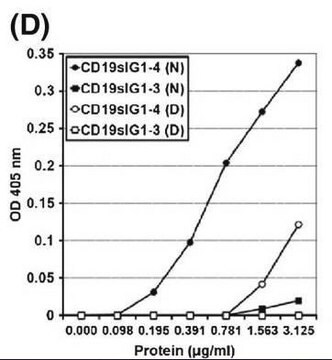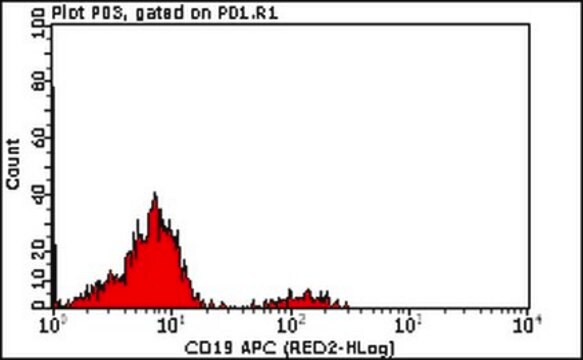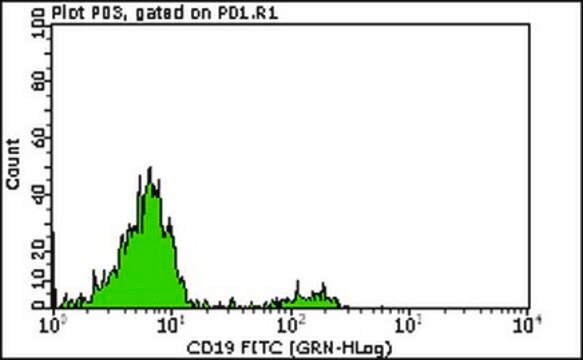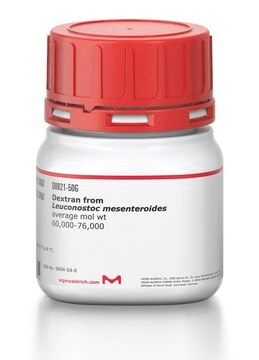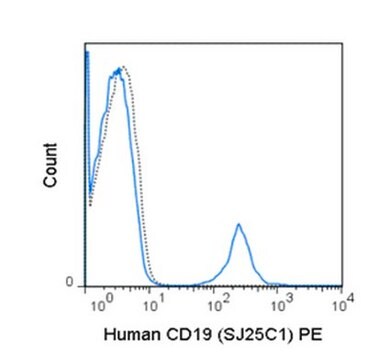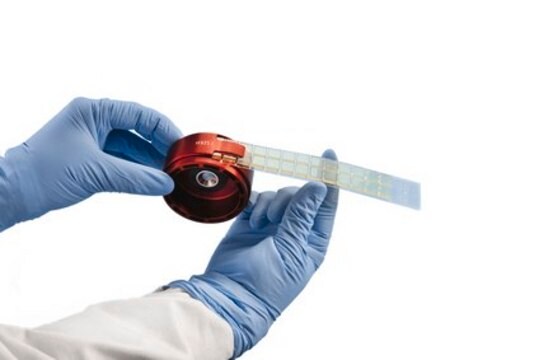MAB1794H
Anti-Human B cells (CD19) Antibody, clone FMC63, Phycoerythrin conjugated
clone FMC63, Chemicon®, from mouse
Synonym(s):
B-lymphocyte Surface Antigen B4
About This Item
Recommended Products
biological source
mouse
Quality Level
conjugate
PE
antibody form
purified antibody
antibody product type
primary antibodies
clone
FMC63, monoclonal
species reactivity
human
manufacturer/tradename
Chemicon®
technique(s)
flow cytometry: suitable
isotype
IgG2a
NCBI accession no.
UniProt accession no.
shipped in
wet ice
target post-translational modification
unmodified
Gene Information
human ... CD19(930)
Related Categories
General description
p I = 7.0
Specificity
Cell reactivity:
Normal:Stains all B lymphocytes in peripheral blood and spleen. Negative on granulocytes, monocytes, platelets, erythrocytes and T lymphocytes.
Clinical:
B cell chronic lymphocytic leukemia (B-CLL) +
Pro lymphocytic leukemia (PLL +
Hairy cell leukemia (HCL) +
Common acute lymphoblastic leukemia (CALL) +
Pre-B acute lymphoblastic leukemia (pre-B-ALL) +
NULL-acute lymphoblastic leukemia (NULL-ALL) +
T-acute lymphoblastic leukemia (T-ALL) -
T-common lymphocytic leukemia (T-CLL -
Immunogen
Application
Inflammation & Immunology
Immunoglobulins & Immunology
SUGGESTED USAGE
Flow cytometry - use 10 μl direct from the vial per 100 μl of whole blood, or 1 x 10E(6) peripheral blood mononuclear cells (PBMC) in 100 μl buffer.
Linkage
Physical form
Storage and Stability
WARNING: The monoclonal reagent solution contains 0.1% sodium azide as a preservative. Due to potential hazards arising from the build up of this material in pipes, spent reagent should be disposed of with liberal volumes of water.
Legal Information
Disclaimer
Not finding the right product?
Try our Product Selector Tool.
Storage Class Code
12 - Non Combustible Liquids
WGK
WGK 2
Flash Point(F)
Not applicable
Flash Point(C)
Not applicable
Regulatory Listings
Regulatory Listings are mainly provided for chemical products. Only limited information can be provided here for non-chemical products. No entry means none of the components are listed. It is the user’s obligation to ensure the safe and legal use of the product.
JAN Code
MAB1794H:
Certificates of Analysis (COA)
Search for Certificates of Analysis (COA) by entering the products Lot/Batch Number. Lot and Batch Numbers can be found on a product’s label following the words ‘Lot’ or ‘Batch’.
Already Own This Product?
Find documentation for the products that you have recently purchased in the Document Library.
Our team of scientists has experience in all areas of research including Life Science, Material Science, Chemical Synthesis, Chromatography, Analytical and many others.
Contact Technical Service